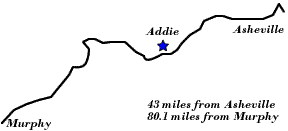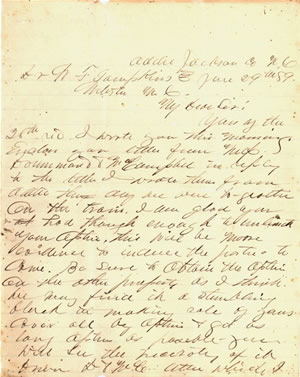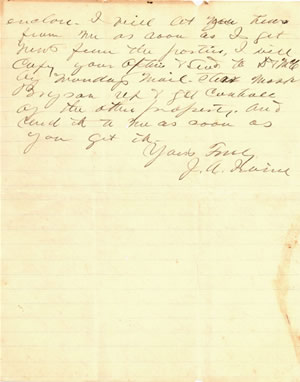Travel Western North Carolina

Following Wagon Trails - 1890s: Addie
Jackson County
Altitude: 2,255 feet
From Addie
“Editor Democrat: -- It has been some time since you have heard from me and owing to the fact that I have been moving about so much that I did not have time enough to write. I now write you from my new home, Addie, N.C. Everybody knows where this place is, from the fact that it is a very thriving little place, and when you see it you will always remember it. We have every facility necessary except schools. We need a good school. We have a store, express and post-office, a railroad office and plenty of good citizens. This place is the best point for trade in Jackson county, in fact there are more goods sold here by one store than at any other place on the line of R R west of Asheville, and they still want more.
"There is a Sunday School at the Clayton school-house, which is run entirely on the old style. They take their Bibles and Testaments and read a chapter, and then they proceed to ask whatever questions they think best. I tell you it looks odd to one who has been taught in the improved schools to attend one of these old-fashioned schools. The farmers are cutting their wheat and laying by their corn. Corn is very good, and wheat entirely above the average crop. The farmers live high up here, and it is generally conceded that Mr. Samuel Cook lives higher than any other, from that fact of this living just under the Balsam mountains. One farmer sold Potts & Coward, last week, five hundred pounds of bacon, and they all have a little corn and such like to sell yet. Where can you beat that in a small neighborhood? . . . .
“I notice the Wilmot Indian has got his bridge built, or I guess he has; he don’t say anything about it of late. What are you doing, Tom? Why don’t you say something for your town.
“We noticed the business manager of the Democrat up here last week with a big receipt book. What for 'Luck' did he have do you suppose? It is too bad not to pay for it after you have taken it. Pay up you subscription and renew it, give encouragement to you county paper, by giving it your undivided support, write for it, work for it, talk for it, preach about it, then subscribe and pay for it. Let all the business men advertise in their county paper and by so-doing let the people to know what you are doing. If you do not take any pride in encouraging your county paper you will not take any pride in encouraging the growth and prosperity of your county. More anon.”
Very respectfully, Tetasca
Addie, N.C.
July 1st, 1889.”
- Tuckaseige Democrat (Sylva, N.C.), July 3, 1889
When a post office was established in this community in 1885, the first postmaster, John P. Calhoun (1847 – 1922), named it for his daughter, Addie. The railroad stop through the community also became known as Addie. As in other community based newspaper columns, the article expressed the accomplishments of the area as well as the needs for future growth. In this case, the writer espouses the virtues of the community with its railroad access and a store, but laments the lack of a “good school.” The column also mentions individuals by name and their recent activities. The reference to “Wilmot Indian” is to a writer from the Wilmot community, who had previously expressed the need for a bridge across the Tuckasegee River in his area. The business manager mentioned as “Luck” was Felix A. Luck, Sr., of the Tuckaseige Democrat newspaper in nearby Sylva, N.C.
Addie Jackson Co N.C.
Dr. W. F. Tompkins
June 29th 89
Webster N.C.
My Dear Sir:
Yours of the 28th rcd. I wrote you this morning. Enclose you letter from M P Doummard & McCampbell in reply to the letter I wrote them from Addie the day we were together on the train. I am glad you had thought enough to unlock your option. This will be more ______ to induce the parties to come. Be sure to obtain the option on the other property as I think we may find in a stumbling block to making sale of yours soon all by option & get as long after as possible - you will see the necessity of its union [?]. D. & McC. after which I enclose. I will let you hear from me as soon as I get news from the parties. I will copy your option & send to D. & McC by Monday mail. I ask Mark Bryson up & get control of the other property. And retd it to me as soon as you get it
Yours Truly
J.A. Harris


In June 1889 J.A. Harris, writing from Addie, N.C., corresponded with Dr. William F. Tompkins about options on property. The arrival of the railroad in western North Carolina had opened the possibilities of developing the region’s natural resources, whether in the form of logging operations, mining, or agriculture. This letter hints at the interest in investments for economic developments and the interrelationship with the railroad. Dr. Tompkins also ran advertisements in the Tuckaseige Democrat (Sylva, N.C.) newspaper in the 1890s about land investments under the heading “Dr. W F. Tompkins’ Mid-Mountain Land and Mining Agency, Webster, N.C.” Among the real estate offerings were, “Farming Lands, Timber Lands, Grazing Lands, Orchard Lands, and Mining Lands.” Tompkins also advised his readers that, “Emigrants, Capitalists and Colonies looking for lands to purchase or locate will do well to correspond with me, before placing their money, in relation to these lands, as I have a large and varied lot in my hands for sale.”
Return to the Southern Railway Map for the 1890s
Sources & Readings
- Jackson County Genealogical Society. Jackson County Heritage, North Carolina, 1992. Cullowhee, NC: JCGS, 1992 (Volume 1) and 2000 (Volume 2).
- McRorie, J.D. “Knowing Jackson . . . How Names Came About,” Sylva Herald (Sylva, N.C), December 12, 1974.
- Williams, Max R., ed. The History of Jackson County. Sesquicentennial ed. Sylva, NC: Jackson County Historical Association, 2001.
